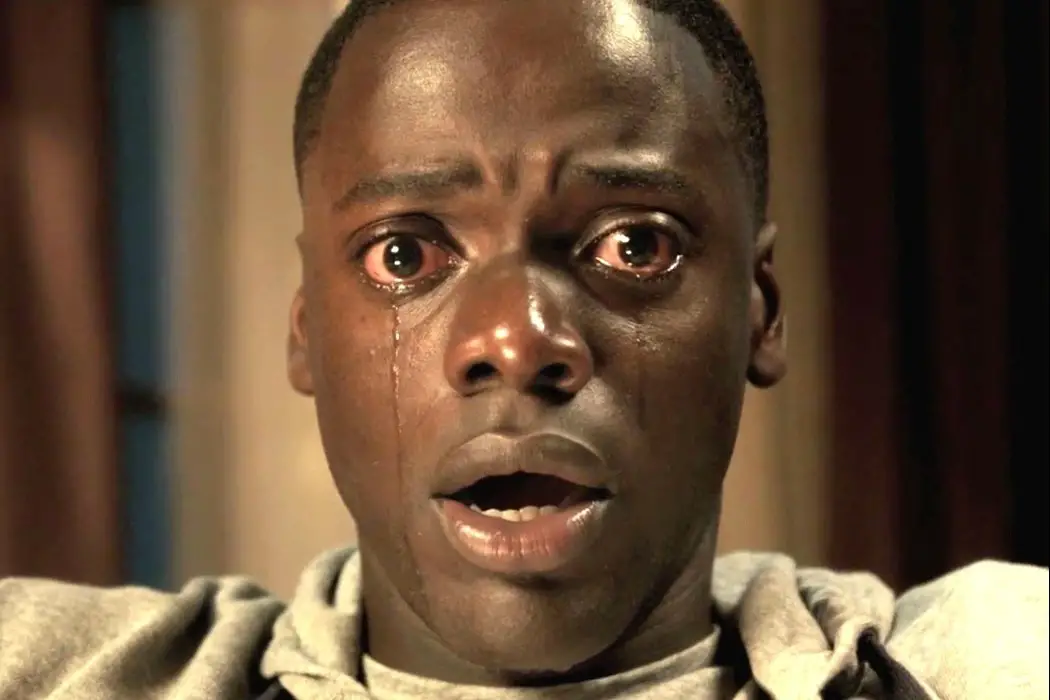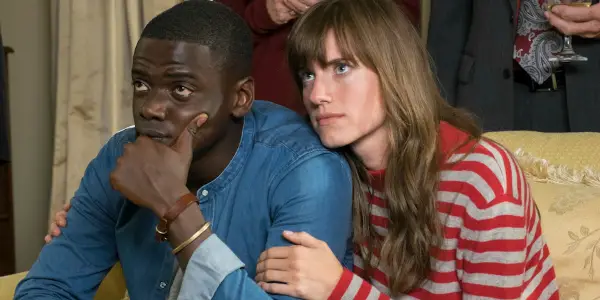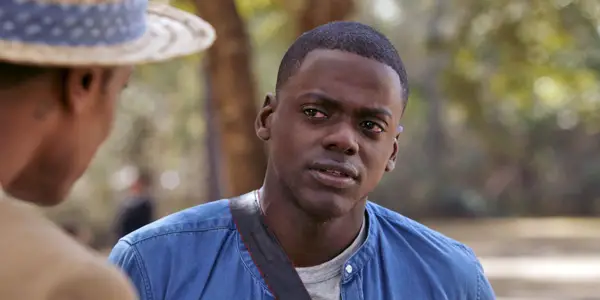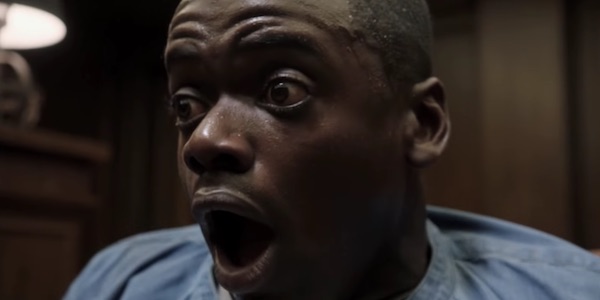GET OUT: The Film You Didn’t Expect to Be THAT Good

Stephanie Archer is 39 year old film fanatic living in…
When the end of the year arrives, and everyone begins to compile their top 10 lists of the best films of 2017, Get Out will unmistakably make several of them – if not all. Making his directorial debut, Jordan Peele brilliantly executes this psychological thriller – underlining serious themes of America and of humanity.
I had doubts regarding this film after the release of its first trailer back in October – doubts that were quickly snuffed out following completion of the film’s opening scene. Within only moments, Jordan Peele, also the film’s writer, has his audience locked in and unwilling to get out. Instantly captivating and undeniably intriguing, Get Out may be the “diamond in the rough” film of the year.
This was a hard review to write, as there were so many amazing and brilliantly used elements within the story and within the filming of Get Out – difficult to write, as diving deeply into each element would spoil parts, if not all, of the film for those who have yet to see it. Walking out of the theater, my mind went over every piece of this film – starting from the end’s twist and revelation and working my way back to the opening scene – then repeat. There was so much depth and planning that went into the development of this film that it would be a cinematic tragedy if the experience is spoiled for viewers.
Getting Out the Plot
The opening scene of this film is impressive – a black man lost in the streets of suburbia talking to himself as a car pulls up alongside him, stating he knows what might happen and it’s not gonna happen to him. While this may not seem like a mind-blowing moment to begin a film with, it airs a resemblance to Wes Craven’s Scream, where characters within the film make fun of a situation they may find themselves in and the ridiculous reactions that typically ensue. As seasoned viewers, we know something will happen, to him most likely, and the feel that it will set for the film. Yet, it was the construction and execution of this scene that set the tone for the direction Jordan Peele would be taking viewers throughout the entire film – horror, thriller, and comedy.

Reaching the five month milestone in their relationship, Chris (Daniel Kaluuya) accompanies Rose (Allison Williams – making her full length feature debut) to her family’s estate for the weekend. While an already seemingly stressful visit, it is compounded by Chris’s reservation regarding Allison’s parents’ thoughts on their interracial relationship, as she has not told them who exactly she is dating. Assured that she wouldn’t expose him to that kind of hostile environment if she thought her parents felt differently than her, Chris and Rose start on their way.
Hitting a deer along the way, the deeper psychology of Chris begins to break through, as well as the mentality of police and the black community – a cop asking for Chris’s license when he was not even the driver. Police racism is addressed early on within this film, yet is quickly challenged by Rose, who will not let anyone treat her man differently – Rose representing those who are willing to speak up and call it as they see it. With the deer and prejudice behind them, they continue on, finally arriving at her family’s estate.
While Chris is welcomed with open arms upon arriving, things begin to take a strange turn when Rose’s father, Dean (Bradley Whitford) suggests hypnosis to help Chris quit smoking – as well as the odd behavior from Rose’s brother, Jeremy (Caleb Landry Jones) whose seeming obsession with MMA turns dinner into an awkward interaction. Yet, it is not just the behaviors encompassing Rose’s family that put Chris on edge.

Beginning to question his surroundings, knowing that something is not right within the Armitage home, Chris finds that the family unit is not the only thing unnerving. The maid and the landscaper, both black, begin to exhibit strange and unexplainable behavior – behavior that, while it seems normal to the family, has Chris questioning his surroundings and his sanity.
Getting Out the Logistics
Jordan Peele is as successful with this film as writer as he is its director. The story is perfectly laid out and timed, each element interlacing with one another, many of which seem basic and unimportant, yet as the film concludes, each piece is unmasked showing its true importance – and true reality. What makes this film superior to its predecessors is the skillfulness with which Peele interlaces thrills with laughs. Humor is in all the right places – maintaining a balance between fear and comedy.
One of the best things while watching a horror/thriller is recognizing the films that are honored or shine through as a form of inspiration. This film is reminiscent of Skeleton Key, Stepford Wives and Scream – even giving a nod to the ultimate man of thrillers Alfred Hitchc*ck, with the music following the opening scene briefly reminiscent of Psycho. Yet, my favorite aspect of this film was the use of the overused thriller mechanism commonly referred to as “bumps in the night”. This tired, old technique was revitalized and made fresh within this film through the witty and careful direction of Jordan Peele. The effectiveness in using the “bumps in the night” is that everything contradicted itself, leaving viewers to question everything – and everyone. With a lack of fingers to point at, anything could give viewers a start and a fright – keeping you at the edge of your seat.
Getting Out the Themes
In a recent interview with The LA Times discussing his new film, Jordan Peele described his inspiration for Get Out – America’s 2008 election of President Obama. He spoke of a feeling that resonated throughout the country following the election; that racism had now ended since a black president had taken office – “For awhile when we had a black president, we were living in this post-racial lie”. Throughout Get Out, there is a vast amount of examples displaying the common ways that racism still exists today. Yet, it is not just the modern racism, but the comparisons to slavery that are brought to the forefront as well.

While modern racism and parallels to slavery remain thematic and relevant within this film, Peele utilizes stereotypical clichés regarding both races while simultaneously addressing the lack of concern for human life, the value of the almighty dollar, and the condemnable sins of revenge and lust. While telling a captivating and intriguing story, Peele does not hold back for fear of offending someone – pushing through these themes, brilliantly executing each and every one – all while still telling a successful story.
Conclusion
Bursting onto the film scene, Jordan Peele’s directorial debut of Get Out was an unexpected success that will give future films to be released in 2017 a run for their money. While the inspiration for this film sprang from a ill-conceived notion that racism was over, it was the heart and dedication of Peele that truly made this film a success.
Revitalizing old techniques for thrills and interlacing a crafty web of thematic notions within its story-line, Get Out is a triumph from start to finish. Upon closure of the film, viewers will find themselves lost in contemplation as they slowly dissect this film and see every piece that was carefully laid out and the true reality that accompanies it.
Did you expect Get Out was going to be good, going in? Let us know in the comments.
Get Out is currently screening in U.S. theaters, and will be released in the UK on March 17, 2017. For all international release dates, see here.
Does content like this matter to you?
Become a Member and support film journalism. Unlock access to all of Film Inquiry`s great articles. Join a community of like-minded readers who are passionate about cinema - get access to our private members Network, give back to independent filmmakers, and more.













